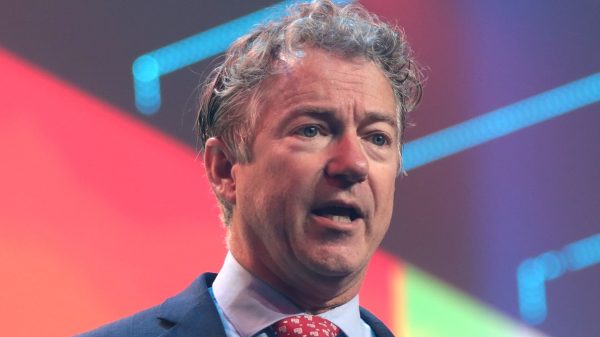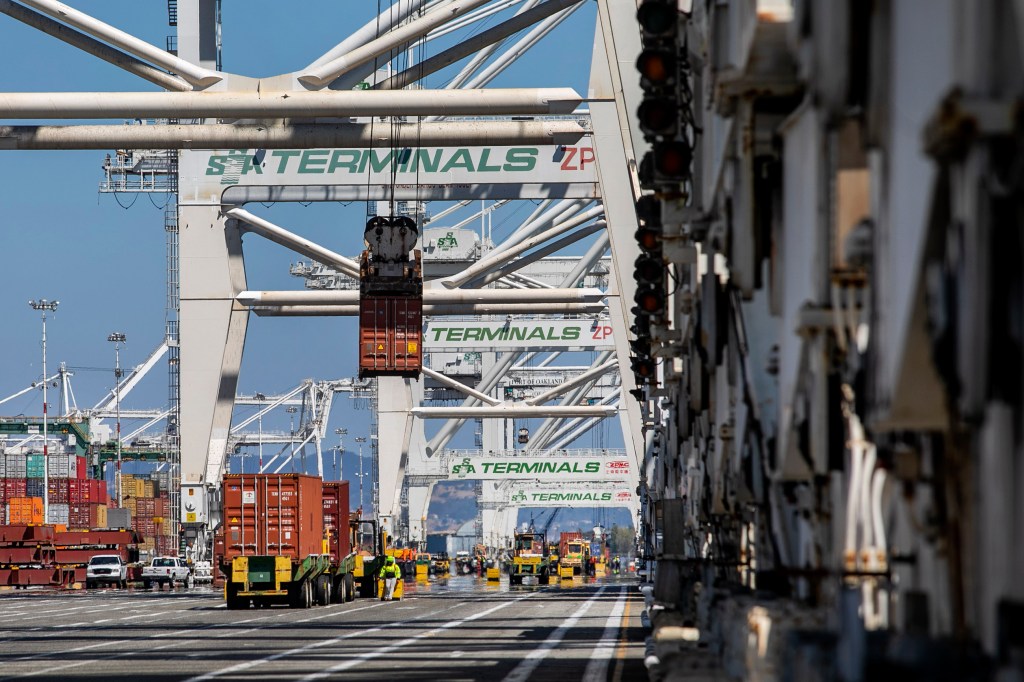The Port of Oakland received the largest federal grant in Bay Area port history last month as part of the Democrats’ Inflation Reduction Act to accelerate the country’s clean energy transition, but the future of that effort may be uncertain with the return of Donald Trump to the Oval Office.
The $322.7 million investment from the Environmental Protection Agency’s Clean Ports Program on Oct. 29 will support the Port of Oakland as it seeks to replace 475 diesel-fuel shipping semi-trailer trucks and 188 pieces of cargo handling equipment, which California leaders and environmental advocates say will bring cleaner air to East Bay communities.
“This federal grant is a giant leap toward reaching our goal of achieving zero-emissions operations at the Oakland Seaport,” Port of Oakland Executive Director Danny Wan said in a statement. “We are grateful for the continued advocacy for green technology, and we thank our community, labor, regulatory and elected partners who played a vital role in supporting this major decarbonization initiative.”

The Port of Oakland, along with 20 community partners in labor, environmental advocacy and multicultural organizations sought a $417 million grant through the EPA’s Clean Ports Program in May. At the time, U.S. Rep. Barbara Lee, an Oakland Democrat, said the project “would be truly transformative” for communities across Oakland which face elevated rates of asthma, stroke and congestive heart failure, according to the Environmental Defense Fund.
It is uncertain how Trump’s presidential win last week will affect decarbonization efforts at the Port of Oakland, and around the country — but they may be difficult to sustain if top conservative policymakers like the Heritage Foundation have a say. The think tank’s controversial Project 2025, a “presidential transition” blueprint for the next Republican administration, calls for eliminating EPA programs that safeguard public health and advance environmental justice.
On Monday, Trump announced on his social media platform Truth Social that he would appoint former Republican Congressman Lee Zeldin to lead the EPA.
“He will ensure fair and swift deregulatory decisions that will be enacted in a way to unleash the power of American businesses, while at the same time maintaining the highest environmental standards, including the cleanest air and water on the planet,” Trump said in his post.
Gov. Gavin Newsom had praised the Biden-Harris administration’s leadership in the port’s “rapid transition to become zero-emission” when the grant was announced. Just over a week later on Nov. 7, however, the governor called a special session of the California legislature to defend the state’s legal protections for civil rights, reproductive freedom, climate immigrant families and climate change against the incoming administration.
Leaders from the Port of Oakland remain optimistic about the port’s zero-emission transition, Port of Oakland Communications Director Robert Bernardo said.
“We’re very confident that we will receive this EPA clean port grant,” Bernardo said. “The Port of Oakland is deeply committed to decarbonizing the supply chain. We’ve made this commitment time and time again, so we’re going to move forward with our clean energy plan.”

The Port of Oakland plays an outsized role in shipping in Northern California, with 99% of all containerized goods arriving and departing from the port. But that level of shipping comes at a cost. A 2021 Port of Oakland analysis found that in 2020, 25,782 tons of greenhouse gases — chemicals that contribute to atmospheric warming and climate change — came from trucks, and another 44,508 tons came from cargo handling equipment.
These major sources of pollution will be replaced by hydrogen-fuel and battery-powered equipment through the influx of federal funding and other investments by the Port of Oakland. The funding comes as part of a $3 billion investment in decarbonizing ports across the country, with approximately one-third of that funding going to ports in California.
“This funding will go a long way toward decarbonizing the Oakland supply chain and providing environmental and economic benefits for the region,” Port of Oakland Board President Michael Colbruno said in a statement.
East Bay environmental organizations celebrated the historic investment in green energy infrastructure for also improving public health outcomes. The investment will support East Bay communities and the Port of Oakland for generations to come, said West Oakland Environmental Indicators Project co-Executive Directors Margaret Gordan and Brian Beveridge.
“This funding will reduce pollution related to health conditions of West Oakland residents and the community,” Gordan and Beveridge said in a statement. “May the Port of Oakland and West Oakland Environmental Indicators Project thrive as partners for Oakland and the next generations.”

















































